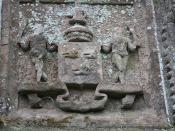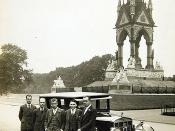The Postman, written by David Brin, is an adventure story of one man's search for civilization. Born in 1950 in Glendale, California, Brin was in the center of technology since birth. In 1973 Brin received a Bachelor of Science from Caltech. From 1973-1977, he was a research engineer for Hughes Aircraft Research Labs. While working for Hughes Aircraft Research Labs from1975-1977, he earned a Masters in electrical engineering from University of California at San Diego. Completing his formal education with a Doctor of Philosophy from the University of California at San Diego, in Space Physics. Later on he became a technical consultant. He has been a consultant for the Jet Propulsion Laboratory, NASA NSCORT for Exobiology (Internet, Brin). David Brin has lived his whole life in the high tech civilization of California and has grown up with nuclear weapons of mass destruction and the exploration of the unknown world around us.
The whole world had been destroyed in a Doom war and had literally destroyed almost all life. A Doom war is a nuclear holocaust with mass destruction of life all around the world. Gordon Krantz, the main character of the story, finds himself wandering for thirteen years in the Pacific North West trying to find some civilization that would take him in as a member of their society. He stumbled on a postal Jeep. The Jeep was from the years before the Doom war. Gordon approached it cautiously and looked inside and found a man in a postal carrier dead in the driver's seat. Gordon took the postal carrier's clothing because his was torn and ragged. When putting on the postal uniform he became aware of what he could possibly use the uniform for him to get food and shelter for a night or two. This uniform brought him a little bit of safety and freedom to each little civilization he went to. When the people recognized him as a postman from the origninal United States of America but did not know exactly why he was around. Thus beginning his endless fictional tale of The Restored United States of America.
While Krantz was searching through the Jeep he found an old map and some old letters that had not been delivered. Keeping with the famous poem of postal workers everywhere "Neither sleet, nor hail"æ" Gordon went off in continuation of his search for civilization and along the way he delivered the letters to the people who survived the Doom war. Tribal societies such as the communities which people after the war live in are very selective on who they let in. Women are generally more welcomed than men. For men, they had to prove that they are strong and will do anything to join. For example, they must kill another male member of the society they want to join or to kill and bring back the scalp of a rival tribe member. This type of socialism is very similar to that of gangs today. People who want to join gangs, usually males, go through some type of ritual or tradition that proves themselves worthy of being a member. From a college student perspective, being apart of a certain type of fraternity gives one a certain status among fellow college students. All pledges to these fraternities or even sororities go through a semester and do certain things to prove their worthiness to be a member. Just like a pledge, Gordon would have had to have to go through a trial and error period until he was fully accepted as a fellow member of a civilization.
Wearing his postal uniform Krantz's first goal was to deliver the mail and to get food and shelter for the night. Having nothing but some out dated letters and a map, Gordon was able to find some little villages. Using his uniform as a disguised, he was able to persuade the mayor of these tribes with lies and by doing his duty of being a postman, delivering letters. Some of the lies he has told was that he was an employee of The Restored United States of America and his duty is to get people in the Pacific Northwest area of the country to communicate peacefully with others from around that region. "In the cultural history of Europe, nationalism has meant frequent wars among a multiplicity of tribally originated nations constantly striving for advantageous alliances against hereditary enemies, and it has also often meant the subordination of weak nations to powerful nations in the ever shifting realignments that so frequently redefine the borders between groups" (McElory 7). When the Holnists were attacking Sugar Loaf Mountain, its citizens were rounding up neighbors to help fight the enemy off. Usually neighbors do not cooperate well with one another but for some cause such as an attack from a mutual enemy, people come together.
In the postwar United States people are living as if it were medieval times, with reference to the scene where Krantz has been captured by the Holnists (Brin 240). The symbolism of Gordon Krantz's uniform is that of safety which is carried throughout the novel. In certain parts of Oregon, people started to recognize him as the Postman. His original stories were passed down from one city to another. He eventually became welcomed at every little place of civilization in Oregon. People today, no matter who they are, recognize that any uniform means that they must be some important person or in an important group of people. When Gordon and John Stevens were captured their clothing was taken away from them to be washed; that is a sign of respect for another group even though they were enemies.
Gordon Krantz's complementary objective to finding civilization is to find one with technology. It seems like that all technology in the world was destroyed within the first three days of the doom war. During Gordon's adventure at the University of Oregon, he came across some Holnists, a young woman and a young child. The woman and child were tied up and to be taken back to the Holnist camp, to try and find out about this thing called Cyclops they spoke of. Gordon killed two of the Holnists and rescued the little boy and returned him safely to Corvallis but unfortunately the young woman was killed. Corvallis is the only community which Gordon has seen electricity being used. This thing called Cyclops is a supercomputer and is the only one left in the world of its kind. So many people from different backgrounds come to ask it questions, but it will only reply with a reasonable and logical answer which the questioner has to interpret. If Corvallis did have a working technology, they would share the whole market with no one else. "Anyone who has been involved in the industry during the last fifteen years need have no doubt about the value of free competition" (Lewin introduction 3). Corvallis is in the business of trading video game technology for food and other goods. The novel does not mention any other group that was trading any type of technology so assuming Corvallis is the only civilization with technology left in the world. As the quote above implies, competition is a great force for continuing research and development. Later on in the novel we learn that Cyclops is just a box with lights with a person in side of it voicing his opinion on subject matter.
After setting up several post offices around Oregon, he now can implement one of his false goals, which is to start the process of restoring a nation. Communication promotes friendship, among other tribal communities interacting with each other. Earlier in The Postman several societies hated their closest neighbor and forced their new members to commit acts against them in order to join. But whenever the Holnists come around everyone is notified to help stop their mutual enemy from attacking. Safety in numbers plays a key role in the story a few times. Just as a common saying goes, "when walking at night, bring someone with you. You are better off in greater numbers than by yourself." An example of being alone and in danger in the novel is when Krantz was snooping in a house, looking for anything he could use to survive. Three men from a nearby village heard him, so they went inside to check the place out. Something suspicious was found in the house when the three guys entered the up stairs master bedroom, a little chest, which has never been seen before, was on the table. The three men left and took up positions around the house in the near by tree line to stop this intruder or to threaten him to never return again. Gordon left the house and was fired upon. After a while of dodging bullets he realized they weren't shooting at him but near him so he would think to never return to the house ever again. Another example of safety in numbers is when the Amazon women of Corvallis go to Powhatan, a great leader of his people on Sugarloaf Mountain. Gordon tried to convince Powhatan that he needed his help in destroying the Holnists. Powhatan refused saying, "most of us have served and served until there is simply nothing more of us to give" (Brin 223). But the Amazon women, with a large amount of the present, persuaded Powhatan to fight for one last time against what he hated most. "You're right. It never ends. I've done my share, a thousand times over I have!"æ All I wanted was to be left to grow old in peace" (Brin 306). Analyzing what Powhatan said: we must work at peace to live long healthy and restful lives. Peace and harmony are not given, that's why there America fought a war against the best army and navy in the world, the British, and won for the right to be free.
The characters in the novel were mostly regular human beings except for the augmented Holnists and Powhatan. These augmented people were specially designed for use in the Doom war to kill and to survive. The skills they possess are barbaric. Their fighting style is hands on, face-to-face interactions, which is different than what the majority of the regular humans do. Ordinary people use some sort of technology like a gun or even a simple bow and arrow. Augments human skills are far less superior to regular human. They are less intelligent, very barbaric acting. There is a difference between the Holnists and Powhatan. Powhatan was more of a regular human being, but possessed more strength and agility. The people to engineered the augments saw that this type of augment is not a great as one that could just fight, so they changed the objectives of these augments to just fighting in the war. It became a growing concern for the safety of humans, which these augments will do anything to survive. People from different regions and beliefs come together to destroy these Holnists augments, which is the only way to stop them.
Safety and freedom as a theme of The Postman is very significant in showing how we take advantage of our technologies and our expansion toward a global community. "Most of the new technological systems were operated with a view to maximizing economic growth as measured by market share and profitability. At the same time, each corporation presumably was enhancing the nation's collective wealth and power" (Smith 4). We can apply this quotation from Major Problems in the History of American Technology to The Postman. The corporation would be each tribal community and Krantz's plan to incorporate technology of the 1990's to enhance the nation's collective wealth and power. "Education is increasingly considered as a precondition for the exercise of other human rights" (Erazo, ix). When Gordon Krantz first came to the villages to deliver letters some of its citizens did not know how to write or if they did, not very well. It shows that as people lose their education technology has no place in society. Overall people use different types of means to promote his or her own safety. With these safety precautions in place freedom can be implemented. One great example about this safety and freedom deployment is of our own country, the United States of America. Before the Revolutionary War we were being abused and taken advantage of by the British loyalists and the King. We secured our safety from them by winning the war, thus giving us our freedom to be American citizens.
Bibliography Brin, David. The Postman. New York: Bantam Books, 1985.
Erazo, Ximena, Kirkwood, Mike, and Vlaming, Frederick de, eds. Academic Freedom 4: Education and Rights. London: Zed Books, 1996.
Internet: http://www.kithrup.com/brin Kallen, Horace. Art and Freedom. New York: Duell, Sloan and Pearce, 1942.
Lewin, Leonard, ed. Telecommunications in the U.S.: Trends and Policies. Dedham, Massachusetts: Artech House, Inc., 1981.
Paul, William. "America's harsh and unjust immigration laws." USA Today. July, 2000.
Smith, Merritt and Clancey, Gregory, eds. Major Problems in the History of American Technology. Boston: Houghton Mifflin Company, 1998.





